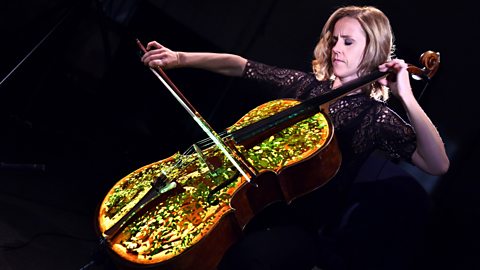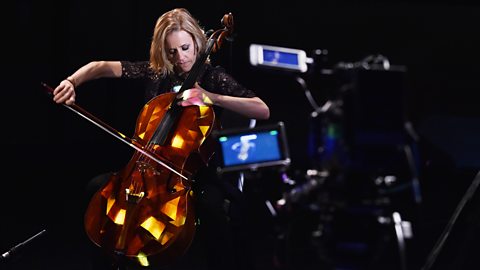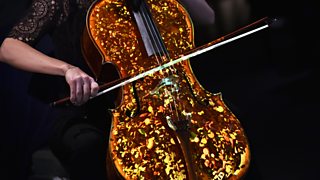How a 300-year-old cello screened a 21st Century light show
The theatre darkens and lights flicker across the surface of Sol Gabetta’s cello. Then, as the unmistakable opening phrases of Elgar’s Cello Concerto surge forward, the instrument springs to life. Sound waves flex and bend with the music, giving way to ethereal landscapes that flit across the surface of the wood.

Cello
See the cello in a new light as Sol Gabetta performs Elgar's Cello Concerto.
Cello is the culmination of weeks of planning. To film it, an instrument nearly three centuries old was upgraded with cutting-edge technology for a truly 21st Century performance.
Not many cellists would consider letting the BBC retrofit an antique cello with an array of high-tech hardware – but Sol Gabetta isn’t just any cellist. She and her luthier, Balthazar Soulier, worked closely with the Proms team to find a strikingly original way of telling her beloved instrument’s story ahead of her Proms debut on Friday 15 July.
The result is stunning: a dynamic, dancing projection that transforms the cello's surface into a screen as it is played. As the film unfolds, the cello is illuminated by a series of animations that evolve with the music.
So how did they do it?
One of the biggest challenges facing the filmmakers was working out how to project images on to a surface that was not only relatively small, but would move constantly during performance.
Their solution was to attach infrared beacons to the cello’s tailpiece and scroll that would send information about their location to an infrared camera rig above. This enabled the cello’s movement to be mapped in 3D space, meaning that the projections would lock on to the cello's surface, no matter how much it moved.
Normally, any such modifications to an antique cello like this one would be unthinkable. But Balthazar, the conservator who helped plan the film, sees the latest additions as just another step in the evolution of an instrument that has already seen plenty of change over the centuries.

How 'Cello' was filmed
Cellist Sol Gabetta's 300-year-old instrument was turned into a screen for a unique film.
Sol’s Goffriller cello dates from 1720s Venice, but was modified in the 19th Century to give it an outline more consistent with the Stradivari school, probably to adapt it to the needs of a French or German owner. Because its tailpiece, fingerboard and scroll aren’t original, the infrared beacons could be attached to them without risking damage to the instrument itself.
“It’s exciting to think that this instrument could have been used to play the very first Vivaldi cello concertos,” says Balthazar. “But it has seen a lot of change over the years. The whole set-up, especially the strings, has always evolved to follow the taste of the times. So it was very exciting for me to see this historical instrument used as a screen.”
The soloist's view
“It was a very interesting experience to see the cello with the Proms, like a photo printed on it,” says Sol, “and to play the Elgar Concerto with all these projections, ahead of the big moment on 15 July.

“Of course, for all cellists, the Elgar Concerto is a very important concerto, but especially to play it in London for my Proms debut. You can imagine how big this feels in my head, to know that I’m in front of a public that knows the piece even better than I do!”
One of the new film’s aims is to put the cello, quite literally, in the spotlight: inviting viewers to reflect on the beauty and versatility of the instrument by making it as much a part of the story as its player.
“People talk about the cello having a human voice,” says Sol (who also confirms that her cello is very much a "he"). “But it can also be a very angry instrument – especially if you’re playing the darkest, lowest strings – or extremely delicate, but never ‘crying’, like you sometimes hear with a violin.
“It’s not just strong: it’s intense, with many colours. There just aren’t any other instruments in existence that have this kind of power.”
